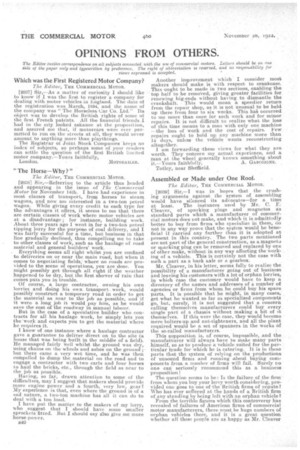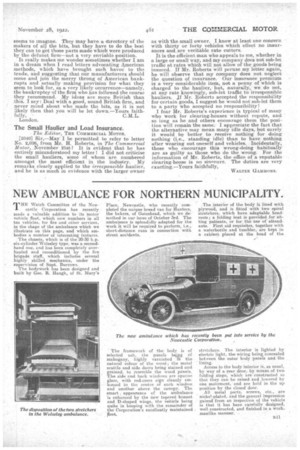OPINIONS FROM OTHERS.
Page 24

Page 25

If you've noticed an error in this article please click here to report it so we can fix it.
The Editor invites correspondence on all subjects connected with the use of commercial motors. Letters should be on one side of the paper only and typewritten by preference. The right of abbreviation is reserved, and MD responsibility for views expressed is accepted.
Which was the First Registered Motor Company?
The Editor, THE COMMERCIAL MOTOR.
[2037] Sir,—As a matter of curiosity I should like to know if 1 was the first to register a company for dealing with motor vehicles in hrigland. The date of the registration was March, 1894, and the name of the company was " The Horselees Car Co. Ltd." Its object was to develop the British rights of some of the first French patents. All the financial friends, I had in the city. looked askance at the proposition, and assured me that, if motorcars were ever permitted to run on the streets at all, they would never amount to anything more than playthings.
The Registrar of Joint Stock Companies 'keeps no index of subjects, so perhaps some of your readers can settle the question of the first British limited motor company.—Yours faithfully, London. MOTORAILER.
"The Horse—Why ?"
The Editor, Tan COMMERCIAL MoToe.
[2038] Sir,—Referring to the article thus headed and appearing in the issue of The Commercial Motor for November 14th. I have had experience in most -classes of transport, from horses to steam wagons, and now am interested in a two-ton petrol wagon. While giving every credit to each. type for the advantages it offers, it seems to me that there are certain classes of work where motor vehicles are at a disadvantage; for instance, building work. ' About three years ago I went in for a two-ton petrol tipping lorry for the purpose of coal delivery, and I was fairly successful for a time, but business in that line gradually declined, thus compelling me to take to other classes of work, such as the haulage of road material and general builders' work.
. Everything seems all right whilst you are confined to deliveries on or near the main road; but when it comes to negotiating fields; where no roads are provided to the scene of operations, you aredone. You might possibly get. through all right if the weather happened to be dry, but the first shower of rain that comes puts you in trouble.
Of course, a large contractor, owning his own lorries and doing his own. transport . work, would possibly construct a temporary road in order to get the material as near to .the job as possible, and if it were a long job it would. pay him, as he would save the cost of the roadway in nianual labour.
But in the case of a speculative builder who contracts for ail his haulage work, he simply lets you the "work and expects you to get the material where he requires it.
I know of one instance where a haulage contractor gave a guarantee to deliver direct on to the site (a house that was being built in the middle of a field). He managed fairly well whilst the ground was dry, using chains on the. wheels and ashes on the ground ; but there came a very wet time, and he was then compelled to dump the material on the road and to engage a contractor with two carts and four horses to haul the bricks, etc., through the field as near to the job as possible. Having, so far, drawn attention to some of the difficulties, may I suggest that. makers should provide more engine power and a fourth, very low' gear? My experience is that, even where the ground is of a sad nature, a. two-ton machine has all it can do to deal with a ton load.
I have put the m.atter to the makers of my lorry, who suggest that I should have some smaller sprockets fitted. But I should say also give me more horse-power.
e40 Another improvement which I consider most makers should make is with respect to crankcase. This ought to be made in two sections, enabling the top half to be removed, giving greater facilities for renewing big-ends without having to dismantle the crankshaft. This would mean a speedier return from the repair shop, as it is not unusual to be held. up there from four to six weeks. This has occurred to me more than once for such work and for minor repairs. It. is not difficult to realize what the loss of this time means to a man with only one machine -the loss of work and the cost of repairs. Few. repairs ought to hold up any machine more than 14 days, unless the vehicle wants reconstructing altogether. am forwarding these views for that they are worth. They concern my actual experience, and a man at the wheel generally knows something. about
it.—Yours faithfully, A. GASCOIGNE. Totley, near Sheffield.
Assembled or Made under One Roof.
The Editor, Ts COMMERCIAL MOTOR.
[2039] Sir,—I was in hopes that the crushing arguments against the system of assembling would have silenced its advocates—for a time at least. The instances used by Mr. C. F: Cleaver, of sparking plugs and magnetos as standard parts which a manufacturer of commei'eial motors does not make, and which it is admittedly better to buy from firms who specialize in them, do not in any way prove that the system would be beneficial if carried any farther than it is adopted at .present in this country. The two parts mentioned are not part of the general construction, as a magneto or sparking plug can he removed and replaced by one of other make, without in' any way affecting the work. ing of a vehicle. This is 'certainly not the case with such a part as a back axle or a gearbox.
Mr. Cleaver, in his letter, seems fully to realize the possibility of a manufacturer going out of business and leaving his customers with a lot of orphan lorries, in which case the customer would have to keep a .directory of the names and addresses of a number of agencies or firms from whom.he could buy his spare parts. It is possible that he might; in many cases, , get what he wanted so far as specialized eoutponents go, 'but, surely, it is not suggested that a concern calling themselves manufacturers could buy every, single part of a chassis without making a bit of it themselves. If this were the case, they would become mere bolters-up and nut-tighteners, and all the plant required would be a set of spanners in the works Of the so-called manufacturers.
This supposition is, of course, impossible, and the manufaeturer will always have to make many parts himself, so as to produce a vehicle suited for the perticular trade for which he is catering. It is in these parts that the system of relying on the productions of unsound -firms and running .about buying components from a number of firms will fail. Surely no one can seriously recommend this as a businesa proposition!
The question seems to be : Is the failure of the firm from whom you buy your lorry worth considering, provided one goes to one of the:British firms of repute? Who has ever suffered at the hands of a Britcsh firm of any standing by being left with-an orphan vehicle? From the terrible figures which thiS controversy has revealed of failures of America-n firms of commercial motor manufacturers, there-must he huge numbers of orphan vehicles there, and it is a great question whether all these people are as happy as Mr. Cleaver seems to imagine. They may have a directory of the makers of al) the bits, but. they have to do the best they can to get those parts made which were produced by the defunct firm—not a very enviable position. It really makes me wonder sometimes whether I am in a dream when I read letters advocating American methods, which have brought such havoc to the trade, and suggesting that our manufacturers should come and join the merry throng of American bankrupts and actually making provision for what they seem to look for, as a very likely occurrence—namely, the bankruptcy of the firm who has followed the course they recommend. My ideas are more British than this. I say : Deal with a good, sound British firm, and never mind about who made the bits, as it is not likely then that you will be let down.—Yours faith fully, C.M.L. London.
The Small Haulier and Load Insurance.
The Editor, THE COMMERCIAL MOTOR.
[2040 Sir,—May I be permitted to refer to letter No. 2,036, from Mr. H. Roberts, in The Commercial Motor, November 21st? It is evident that he has entirely misunderstood my letter ! I did not criticise the small hauliers, some of whom are numbered amongst the most efficient in the industry. My remarks clearly applied to the irresponsible haulier, and he is as much in evidence with the larger owner
as with the small owner. I know at least one concern with thirty or forty vehicles which effect no insurances and are veritable rate cutters.
It is the efficient man who appeals to me, whether in a large or small way, and my company does not sub-let traffic at rates which will not allow of the goods being insured. If Mr. Roberts will peruse my letter again, he will observe that my company does not neglect the question of insurance. Our insurance premium is a very considerable item, not a penny of which is charged to the haulier, but, naturally, we do not, , at any rate knowingly, sub-let traffic to irresponsible hauliers. If Mr. Roberts accepted the responsibility for certain goods, I suggest he would not sub-let them to a party who accepted no responsibility!
I fear Mr. Roberts's experience is typical of many who work for clearing-houses without repute, and so long as he and others encourage them the position will remain the same. I appreciate the fact that the alternative may mean many idle days, but surely it would be better to receive nothing for doing nothing (i.e., standing idle) than to have nothing after wearing out oneself and vehicles. Incidentally, those who encourage this wrong-doing habitually are as guilty as those who do the wrong. For the information of Mr. Roberts, the office of a reputable clearing-house is no sinecure. The duties are very exacting.—Yours faithfully,
WALTER GAmmoNs.




























